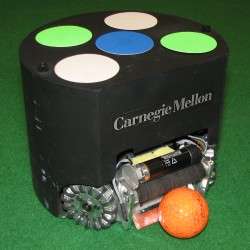June 15, 2010 report
US soccer robots get new algorithm for RoboCup 2010 (w/ Video)

(������ƵOrg.com) -- The World Cup is gaining the most attention at the moment from soccer fans around the globe, but next week RoboCup, the annual world championship for soccer robots, gets underway in Singapore. RoboCup’s goal is to develop autonomous humanoid soccer-playing robots capable of beating the best human players playing under FIFA rules by 2050, and American researchers think their new robots will take that aim a step closer.
The American robots, developed at the Computer Science Department of Carnegie Mellon University in Pittsburgh, use a new physics-based algorithm that takes into account ball dynamics, and enables the robots to calculate where the ball is most likely to go next instead of simply reacting to the ball or following the US team’s previous strategy of using pre-programmed plays (similar to a strategy in American football).
Stefan Zickler, who wrote his PhD thesis on the algorithm, said previous robots could not tell when they would lose control of the ball when carrying out maneuvers such as dribbling, but the new algorithm helps them make such predictions, and this gives them a distinct advantage over robots without the algorithm.
Zickler and colleagues tested an earlier version of the algorithm at last year’s RoboCup, and their robots were highly successful until the quarter finals, when a disastrous glitch left the robots blind and dashed their hopes of a win.
Professor of Computer Science, Manuela Veloso, believes this year’s team of five miniature robots, CMDragons, will be more successful, telling the Pittsburgh Post-Gazette she doesn’t “see any reason why we won’t win”.
The mini-robots are under the control of a computer watching the action via camera above the playing field. Without the physics algorithm the computer tries to position the robots on the ball but does not make any predictions of the ball’s movement. With the algorithm this weakness is addressed, and the robots can now be moved into a position where the ball is predicted to go, which improves the skills required. The computer is able to make up to 60 decisions per second.
Carnegie Mellon will also enter a team of humanoid robots in the Standard Platform League. The humanoids walk on two feet and can speak and use landmarks to determine their positions.
The robots can also be used for other games such as mini-golf (video below), but soccer is the game of choice because of the constant changes in the environment and because of the cooperation required between players. The algorithm could also have a more practical use in helping robots fight fires, taking into account factors such as the type of trees and the effects of the wind.
RoboCup, which has been running since 1997, is the largest robotics and artificial intelligence event in the world attracting competing teams from countries such as the US, Brazil, Japan, and Iran.
More information:
* Stefan Zickler's webpage:
*
*
*
© 2010 ������ƵOrg.com



















